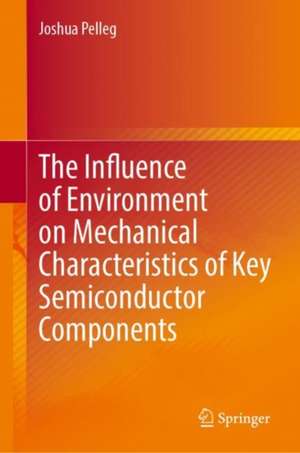The Influence of Environment on Mechanical Characteristics of Key Semiconductor Components
Autor Joshua Pellegen Limba Engleză Hardback – 10 noi 2024
This book is a valuable resource for researchers, engineers, and students inthe fields of materials science and engineering, semiconductor technology, and nanotechnology. It highlights the urgent need to assess the global environmental impacts of these materials and suggests alternate uses for their production in order to preserve life on earth.
Preț: 422.78 lei
Preț vechi: 459.54 lei
-8% Nou
Puncte Express: 634
Preț estimativ în valută:
80.91€ • 87.85$ • 67.96£
80.91€ • 87.85$ • 67.96£
Carte nepublicată încă
Doresc să fiu notificat când acest titlu va fi disponibil:
Se trimite...
Preluare comenzi: 021 569.72.76
Specificații
ISBN-13: 9783031345296
ISBN-10: 3031345290
Pagini: 250
Ilustrații: Approx. 250 p.
Dimensiuni: 155 x 235 mm
Ediția:1st ed. 2024
Editura: Springer Nature Switzerland
Colecția Springer
Locul publicării:Cham, Switzerland
ISBN-10: 3031345290
Pagini: 250
Ilustrații: Approx. 250 p.
Dimensiuni: 155 x 235 mm
Ediția:1st ed. 2024
Editura: Springer Nature Switzerland
Colecția Springer
Locul publicării:Cham, Switzerland
Cuprins
The Environmental Challenge in Semiconductor production.- Elastic Properties.- Plastic deformation.- Hardness and tensile properties. The Effect of Environment.- Strength - The Effect of Environment.- Brittle Behavior the Effect of Environment.- Creep –Time dependent deformation. Effect of Environment.- Fatigue-Cyclic deformation. Effect of Environment.- Fracture - Effect of Environment.- Twinning - Effect of Environment.- Fracture toughness - Effect of Environment.- Deformation in Nanostructure - Effect of Environment.
Notă biografică
Joshua Pelleg received his B.Sc. in Chemical Engineering at the Technion-Israel Institute of Technology, Haifa, Israel, M.Sc. in Metallurgy at the Illinois Institute of Technology, Chicago, IL, and Ph.D. in Metallurgy at the University of Wisconsin, Madison, WI. He has been in the Ben-Gurion University of the Negev (BGU) Materials Engineering Department in Beer-Sheva, Israel, since 1970, and was among the founders of the department, and served as its second Chairman. Professor Pelleg was Recipient of the Samuel Ayrton Chair in Metallurgy. He specializes in the mechanical properties of materials and the diffusion and defects in solids. He has chaired several university committees and served four terms as Chairman of Advanced Studies at Ben-Gurion University of the Negev. Prior to his work at BGU, Pelleg acted as Assistant Professor and then Associate Professor in the Department of Materials and Metallurgy at the University of Kansas, Lawrence, KS. Professor Pelleg was also Visiting Professor: in the Department of Metallurgy at Iowa State University, at the Institute for Atomic Research, US Atomic Energy Commission, Ames, IA; at McGill University, Montreal, QC; at the Tokyo Institute of Technology, Applied Electronics Department, Yokohama, Japan; and in Curtin University, Department of Physics, Perth, Australia. His non-academic research and industrial experience includes Chief Metallurgist in Urdan Metallurgical Works Ltd., Netanya, Israel; Research Engineer in International Harvester Manufacturing Research, Chicago, IL; Associate Research Officer for the National Research Council of Canada, Structures and Materials, National Aeronautical Establishment, Ottawa, ON; Physics Senior Research Scientist, Nuclear Research Center, Beer-Sheva, Israel; Materials Science Division, Argonne National Labs, Argonne, IL; Atomic Energy of Canada, Chalk River, ON; Visiting Scientist, CSIR, National Accelerator Centre, Van de Graaf Group Faure, South Africa; Bell Laboratories, MurrayHill, NJ; and GTE Laboratories, Waltham, MA. His current research interests are mechanical properties, diffusion in solids, thin-film deposition and properties (mostly by sputtering) and the Characterization of films, among them various silicides. His research activity is summarized in his publications in various scientific journals and in 10 books published by Springer and Elsevier.
Textul de pe ultima copertă
This book provides a comprehensive overview of the impact of environmental constituents on the mechanical properties of semiconductors. Chapter 1 sets the stage by outlining the various environmental constituents that can have deleterious effects on both the mechanical properties of materials and the health of those who handle them. This includes gases such as oxygen, nitrogen, hydrogen, air, and moisture in the air, some of which are responsible for greenhouse gas emissions that directly affect the climate. Chapters 2 through 12 delve into specific aspects of mechanical behavior, including elastic properties, plastic deformation, defects, hardness, brittle behavior, impact testing, deformation processes, and time-dependent deformation. The book also examines how the behavior of semiconductors differs at the nano scale and provides insights into improving their mechanical properties.
This book is a valuable resource for researchers, engineers, and students inthe fields of materials science and engineering, semiconductor technology, and nanotechnology. It highlights the urgent need to assess the global environmental impacts of these materials and suggests alternate uses for their production in order to preserve life on earth.
This book is a valuable resource for researchers, engineers, and students inthe fields of materials science and engineering, semiconductor technology, and nanotechnology. It highlights the urgent need to assess the global environmental impacts of these materials and suggests alternate uses for their production in order to preserve life on earth.
Caracteristici
Presents in-depth analysis of specific aspects of mechanical behavior Shows the environmental impact on semiconductor mechanical properties Suggests alternate production methods for semiconductors to preserve life on earth
